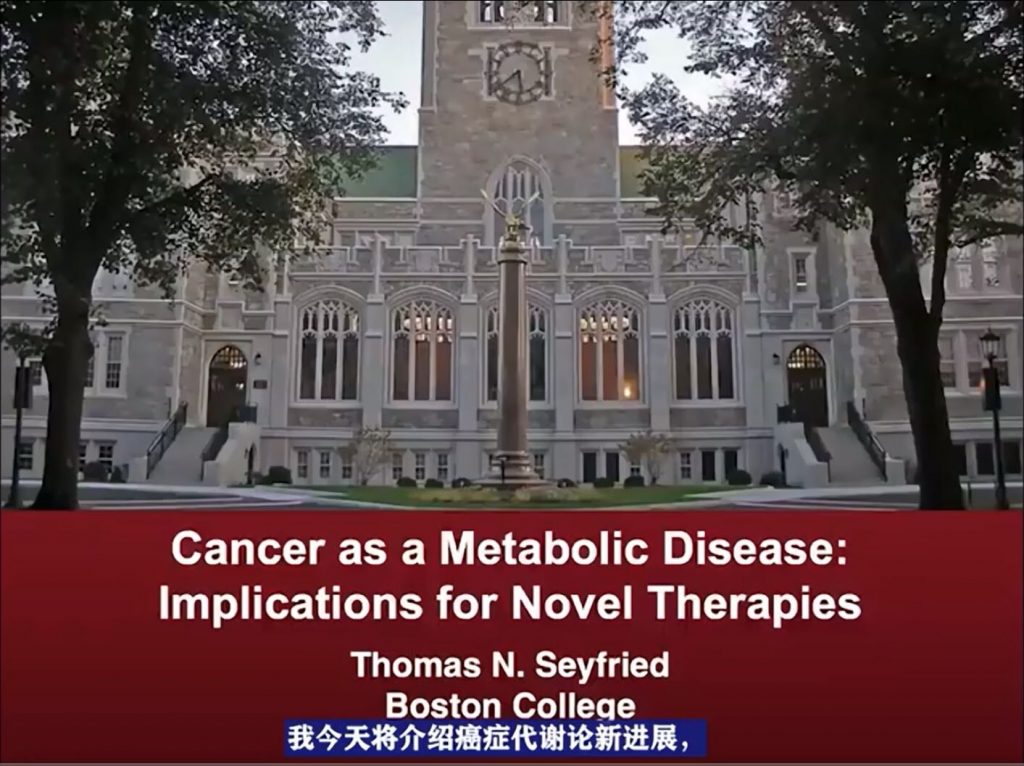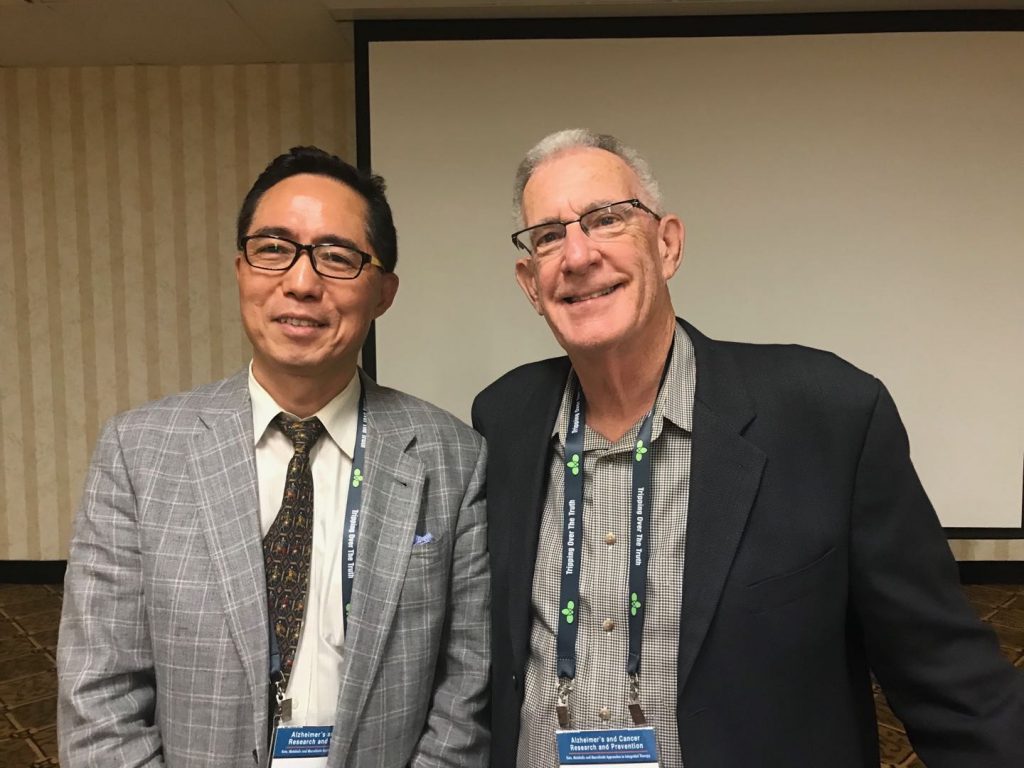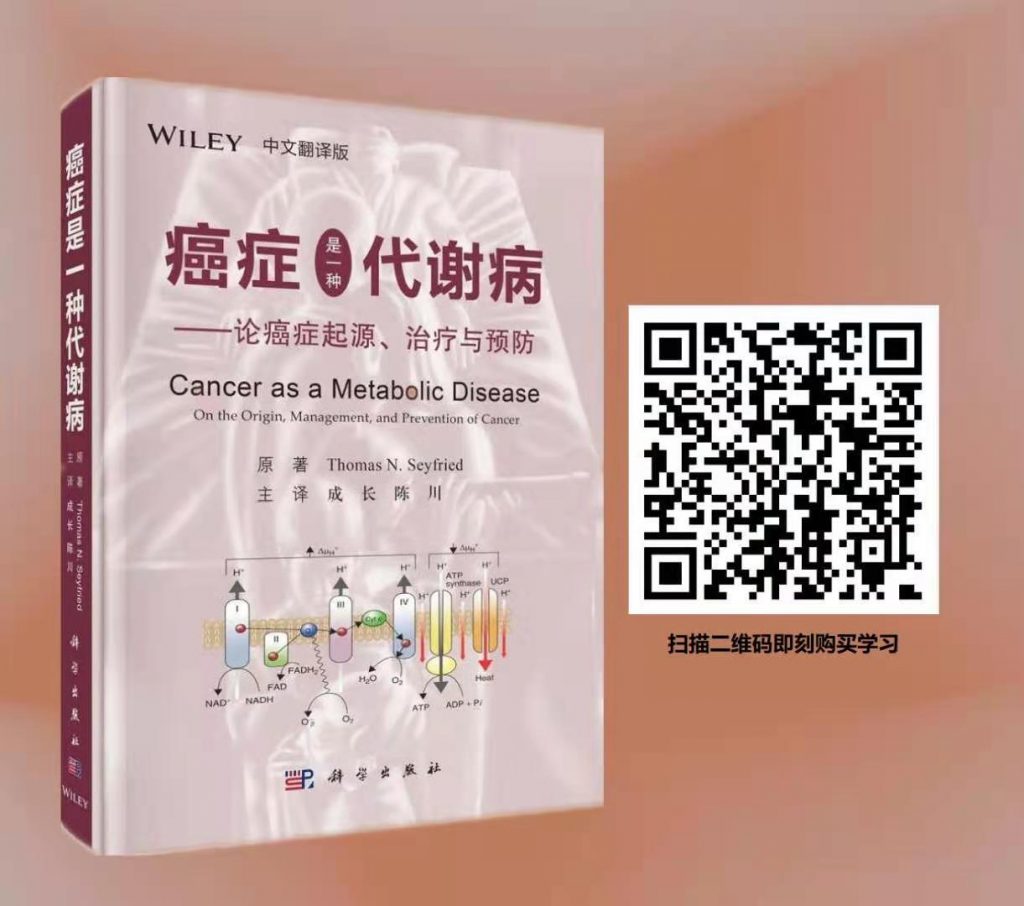Updated Dec. 5th, 2o20.
Upon my invitation, Dr. Tom Seyfried, Professor of Biology at Boston College delivered this video lecture (English with Chinese caption) to the 2nd annual Conference of China Low Carbon Medicine Alliance on November 15, 2020. Dr. Seyfried is an internationally well known scientist on cancer metabolic theory. He published masterpiece Cancer as a Metabolic Disease: on its Origin, Management and Prevention in 2012. We translated it into Chinese and published in 2018. Cancer metabolic theory has received great responses internationally.
From pathogenesis to prevention and clinical management, cancer metabolic theory overturns the traditional cancer genetic mutation theory, better answers the question why cancer is still not a curable disease, and points to the right direction of cancer prevention and management. The initial results of cancer metabolic therapy both internationally and from our team are very promising.
Dr. Cheng with Dr. Seyfried, Oct. 2020, at the International Cancer Metabolic Theory Conference, Baltimore
Author: Tom Seyfried, Ph.D.
Editors (Chinese): Richard Z. Cheng, M.D., Ph.D, Chuan Chen, MD. Publisher: China Science Press, Beijing 2018
Summary
Most cancer are caused by various factors including carcinogens and unhealthy lifestyle. These factors not only affect our genes, but they also damage our mitochondria, the energy source of our cells. A large number of studies have pointed to the damage of energy production in mitochondria as the key mechanism of cancer development. When energy supply is insufficient, cells will die. But every cell is an independent life. In order to survive, cells shuffle genes to enhance the glucose and glutamine fermentation for energy production (so called substrate level phosphorylation) , which is normally suppressed. Dr. Seyfried also pointed out that this energy metabolism disorder is also the root cause of cancer metastasis.
Our integrative cancer management starts from lifestyle changes, especially diet (restrictive ketogenic diet), including nutrition (especially antioxidants, mitochondrial nutrients), toxin removal, and hormone balance. It’s not just the lifespan of a cancer patient that matters, but equally importantly the quality of life of these patients that matters. We do not only focus on the inhibition or killing of cancer cells, but also stress the importance of the overall health of the cancer patient.
Cancer Metabolic Theory
We were all told that cancer is a disease caused by DNA mutations. Based on this dogma (so called Somatic Mutation Theory), a few initial insulting mutations (so called driver mutations) will start the cancerous process, causing many other mutations in a cell and eventually turn the cell into a cancer cell. So all the daughter cancer cells should bear the same driver mutation fingerprints. The scientists have been searching for these driver mutations for the past decades. If we could find these driver mutations, then we should be able to develop unique drugs to target them and kill them all. This was the holy grail for scientists. Starting in the mid 1990s, DNA sequencing became rapid and inexpensive. Scientists mapped the whole human genome in the 1990-2000 era (the Human Genome Project). Very quickly, scientists also sequenced many cancers (The Cancer Genome Atlas, TCGA). But to our dismay, we did not find the driver mutations everyone was looking for. A driver mutation is a grand father mutation that causes a cell to turn into cancer cell, so it must be present in all (at least the majority) of cancer cells. But scientists have not found even one such driver mutation. Yes, cancer cells display numerous DNA mutations. But these mutations vary greatly from cancer to cancer. Even in the same patient, cancer cells from the same tumor mass show different mutations. All in all, no one can find any specific mutations that are present in a majority (let alone all) cancer cells. This has really frustrated all cancer research scientists.
Actually not all scientists believed this driver mutation theory. Dr. Pete Pedersen of Johns Hopkins University and Dr. Thomas Seyfried of Boston College are among the leaders of a few scientists who believed that cancer is a metabolic disease, a disease not caused by the DNA mutations, but caused by the mitochondrial damage. This is a very old theory, proposed by the late Dr. Otto Warburg, a Nobel laureate, back in the 1920s. Warburg observed that while normal cells can burn both glucose and fat as fuel, most, if not all, cancer cells use glucose as their only or primary fuel. Normal cells burn glucose through 2 pathways: anaerobic glycolysis or fermentation (i.e., in the absence of oxygen, glucose is converted to pyruvate and lactate with minimal energy production). But whenever oxygen is present, glucose is mostly burned through Oxidative Phosphorylation (OxPhos), in the mitochondria, which produces 18 times more energy than the fermentation process. However, Warburg observed that cancer cells, even in the abundant presence of oxygen, uses mostly anaerobic glycolysis to produce energy. This phenomenon is known as the Warburg Effect. The PET scan we use for cancer diagnosis today is based on this glucose preference of cancer cells: cancer cells use far more glucose than normal cells as fuel. Hence, radio-labeled glucose is injected into a patient which is then taken up mostly by the cancer cells. The radio-label lights up the cancer cells like a Christmas tree.
The Major Problems with the Current Gold Standard of Cancer Therapies
- For the past several decades, since Nixon’s War on Cancer, the cancer treatment result (commonly measured as 5-year survival) for most cancers (esp. cancers of solid tissues like the liver, lungs, pancreas and colon) has not changed much (PMID: 15630849), despite the much money and manpower put into this War on Cancer. The progress on cancer has been mostly on early diagnosis and early surgical removal of cancers, very limited on chemo or radiation therapy of advanced cancers.
- The theory (Somatic Mutation Theory) based on which the current cancer drug development/treatment is based is seriously being challenged and, very likely, outright wrong.
- Cancer stem cells. All cells including cancer cells come from stem cells. When stem cells divide to give rise to 2 daughter cells, one usually goes dormant while the other keeps diving. Current chemo/RAD don’t kill these stem cells. Cancer stem cells are a major source of drug resistance and disease relapse.
- The current chemo/RAD therapies for cancer are often too toxic and don’t kill stem cells (above). This approach aims only to kill the enemy cells and do nothing to boost patient’s own defense.
Cancer Metabolic Therapy
Based on this theory that cancer cells mostly rely on glucose as fuel, one can devise a strategy to “starve” cancer cells by limiting their fuel supply (cutting off sugar and carbs in their diet and increase healthy fats as the fuel, or so called Ketogenic Diet), as well as using glycolysis inhibitors (to further block fermentation pathway of cancer cells). This approach will seriously reduce the energy supply to the cancer cells while the normal cells are unaffected. Using this approach (or some variation of it), people have achieved very promising results worldwide. Here is a short list of some selected reports:
- Slocum et al reported (Metabolic Therapeutics Conference, 2/4/17, Tampa FL) their result of treating 44 cases of stage 4 lung cancer (NSCLC) using a combination of chemo/RAD and metabolic therapy. The 1-year survival rate of this group of patients was 86.1% (compared to 18% in the literature, PMID 3096514).
- The same group (Slocum et al) reported 82.6% 1-year survival for a group of 33 cases of stage 3/4 pancreatic cancers, compared to 20% 1-year survival of combined stages 1-4 in the literature (Slocum et al., J of Pancreas, 2016 Jan. 08, 17(1)36-41).
- A case report: an 81 year-old woman diagnosed of stage 3 rectal cancer is still in clinical remission 27 months (by the time or report) after using chemo and metabolic therapy (Slocum et al. 2016).
- Roger D was diagnosed of stage 3 bladder cancer in June 2016. He chose not to get any chemo/RAD, instead he started ketogenic diet in July. In a short few months, he was in clinic remission (personal communication).
- Linda Nabeling of Case Western U reported over 20 years ago 2 cases of advanced brain tumor (stages 3/4) in 2 young girls (3 and 8 years old). They were given only months, if not a few short years, to live. These girls were first treated with chemo/RAD with severe side effects and later switched to metabolic therapy (ketogenic diet), both girls were still well (with no clinical sign of cancer) and alive 9 and 15 years later (with the most recent follow up data).
- Melanie Schmidt of Wurzburg Germany reported a 16 case 3-months trial of ketogenic diet. Those who followed the diet were found to have tumor either not progressing or reduced in size.
- Eugene Fine of Albert Einstein Medical School reported 10 cases back in 2012 of going on ketogenic diet. PET-CT showed no progression or or even reduction in tumor size.
- Beth Zupec-Kaniay applied ketogenic diet to 10 brain cancer patients. All showed improvement and some even achieved long time survival.
- Ko and Pedersen of the Johns Hopkins University applied 3-bromopyruvate (3-BP) to a late stage gastric cancer with liver metastasis (with 95% liver damage) and severe ascites to a young boy. The boy’s doctor predicted he won’t survive until the next birthday. The boy’s father, out of desperation, found Ko and Pedersen team. They used 3-BP for the patient and the patient achieved complete remission: no sign of cancer cells anywhere! The patient survived more than 2 years and eventually died of pneumonia due to poor liver function, not due to cancer recurrence. At autopsy, no cancer cells were to be found anywhere.
- Aasmund, a young Norwegian athlete, was found a 10cm lymphoma (mediastinum), 9 years ago. After a few toxic rounds of chemo without much success, he gave up on chemo and switched to metabolic therapy. He consulted me ~3 years ago. I recommend integrative therapy, including high dose IV Vit C. He reported to me about 1 year ago that he finally became cancer-free!
- Joey, a 44 year-old woman of Hong Kong, was found (2016) to have stage 4 breast cancer with metastasis to the lungs, liver, left supraclavicular lymph node and vertebral bodies. She was also given a few months to live. She received a few rounds of chemo and also added metabolic therapy. Her tumors in the breasts, lungs and neck are gone with only some residual tumor activity in the liver. She has returned to part time work about 1 year and a half ago. When I saw her in Hong Kong about 3-4 years ago, she was wheelchair bound, very weak and pale.
- Csaba Toth reported a patient with oral cancer. The patient declined all surgical, chemo/RAD and went on ketogenic diet. 20 months later, the tumor reduced in size (confirmed by MRI) and the patient is fine without any side effects or symptoms.
- Dr. Zuccoli reported a case of his mother with brain tumor (glioblastoma multiforme). Knowing how bad the cancer is, Dr. Z convinced his mother to go on ketogenic diet. Within a few months, her cancer was nowhere to be found (confirmed by MRI). She stayed on ketogenic diet and the cancer remained under control (MRI). But then when she went off the ketogenic diet, the cancer came back.
Other Anti-Cancer Therapies
High dose vitamin C intravenously (HDIVC) for cancer treatment has been reported in the literature for a long time. HDIVC is safe and without significant side effects, according to the Physician Data Query, published by the National Cancer Institute, NIH, Bethesda, MD, if done properly under the supervision of a trained healthcare professional. We have extensive experience with this therapy.
- Vitamin C. Large dose Vitamin C has been used in cancer treatment for a long time. When used properly, large dose IV Vit C (Gonzalez et al., J of Orthomolecular Medicine V30, No.1, 2015);
- Can improve patient’s quality of life;
- Reduces side effects due to chemo/RAD;
- Reduces viral/bacterial/fungal complications of cancer patients as well as improves the symptoms of a patient’s Vit C deficiency and inflammation;
- Can kill cancer cells via
- Competitive inhibition of glucose uptake by the cancer cells;
- Reduce the oxidative stress in a cancer cell, with Vit C being an electron donor;
- Kills cancer cancer cells via H2O2 produced by Vit C.
- Increases collagen synthesis, improves the immunity.
Our Integrative Cancer Therapies
We believe that cancer is a chronic disease and can/should be managed as such. We take an integral approach to cancer treatment with 2 goals:
- Any methods that kills cancer cells without significant side effects, including conventional chemo/radiation therapy.
- Boosting patient’s own health using anti-aging/functional medicine approach. This very important part of the treatment has been largely ignored by the conventional cancer therapies in the past.
Specifically, we use an integral approach to treat cancers (esp. advanced stage cancers) using the Restricted Ketogenic Diet + Glycolysis Inhibitors + Broad Spectrum Nutritional Supplementation + Large Dose IVC. If you have any questions, please schedule an appointment by calling 803.233.3420 to come to talk to Dr. Cheng.



